同义词、近义词辨析
同义词、近义词辨析

同义词、近义词辨析第一段:同义词、近义词是指同一个概念或意义的不同表达方式,是汉语里的一种文字的特殊表现形式。
它们是句子里最常见的修辞形式,被广泛用于文学、诗歌、散文、修辞、新闻中。
同义词和近义词不仅可以用于改变句子的表达形式,而且还可以使句子变得更加优美。
因此,正确使用同义词、近义词和适当的句式,可以让文章变得富有艺术性。
第二段:同义词和近义词之间的区别在于,同义词指的是完全相同的概念或意义,而近义词则指的是接近、相似的概念或意义。
例如,“友谊”和“友情”是同义词,因为它们指的都是相同的概念;而“友谊”和“爱情”是近义词,因为它们指的是接近、相似的概念,但又存在差异。
第三段:同义词和近义词不仅能够改变句子表达方式,同时还能够改变句子的语气。
使用时,我们应当注意:一个句子中不能混用同义词和近义词;并且,一个词的同义词和近义词之间有差别,因此我们应当根据句子的上下文来科学使用;最后,除了要注意使用形式,更重要的是要熟悉这些词的含义,才能在表达中准确表达自己的思想。
第四段:此外,使用同义词和近义词时,还应当注意地域文化的差异,以免造成理解上的误会和歧义。
同义词和近义词受到地区文化等因素影响,也和时代背景有关,如果句子出现歧义或理解上的误差,说明句子中同义词或近义词的使用有误,无法达到所要表达的意义。
第五段:正确并合理使用同义词和近义词,对提升文章表达能力和表达方式都有极大的帮助。
它们可以增加文章的凝练度和生动性,有助于强调文章的核心思想,更好地表达自己的观点和思想。
同时,也可以减少文章的重复,减少字数,让文章变得更加简明、鲜明,从而使文章变得更具吸引力。
第六段:因此,对于同义词和近义词的学习和掌握是提升文章表达能力的重要环节。
只有通过多多的练习、阅读、思考,我们才能掌握同义词和近义词的灵活运用,使文章更具艺术性。
词义辨析区分近义词与词语辨析

词义辨析区分近义词与词语辨析词义辨析,作为语言学中的一个重要研究领域,是对于近义词以及词语辨析的深入探讨和区分。
通过对近义词的差异和词语辨析的细微区别进行分析和讨论,可以更加准确地使用和理解语言,增强沟通的准确性。
本文将就词义辨析、近义词以及词语辨析三个方面展开讨论,以期帮助读者更加准确地理解这些概念并正确运用。
一、词义辨析词义辨析是一种对于具有相似或接近意义的词汇进行分析和区分的过程。
常见的词义辨析包括同义词、反义词、近义词等概念。
1. 同义词同义词指的是在语义上相近或相似的词语。
这些词语之间往往能够互相替代,但在具体语境中可能存在微妙的差别。
比如,“美丽”和“漂亮”就是两个同义词,都可以用来描述一个人或者一件事物的外貌或特征。
2. 反义词反义词指的是在语义上具有相反意义的词语。
它们的用法和含义完全相反,常常是一个事物的两个极端。
比如,“善良”和“邪恶”就是两个反义词,分别表示一种积极的品质和消极的品质。
3. 近义词近义词指的是在语义上相近但不完全相同的词语。
它们的用法和含义存在细微差别,需要根据具体语境进行运用。
比如,“幸福”和“快乐”就是两个近义词,都表示一种心情愉悦的状态,但“幸福”更强调长久和内心的满足,而“快乐”则更偏向一时的愉快和欢笑。
二、词语辨析词语辨析是对于在具体语境中容易混淆的词汇进行分析和区分的过程。
常见的词语辨析包括同根词、易混词、近音词等概念。
1. 同根词同根词指的是在词根或词义上存在联系的词汇。
它们可能在形态上有所变化,但在含义上具有一定的共通性。
比如,“国家”和“国际”就是两个同根词,都与“国”这个词根有关,表示与国家及其关系有关的概念。
2. 易混词易混词指的是在形式或含义上非常相近,容易混淆的词汇。
这些词语之间的差异可能非常微妙,需要仔细辨别。
比如,“讲”和“讲解”就是两个易混词,在日常用语中可以互相替代,但在学术或正式场合中有所区别,前者表示简单的表述,后者则表示详尽解释。
词语辨析学习区分近义词和同义词

词语辨析学习区分近义词和同义词词语辨析是语言学习的重要内容之一,它帮助我们区分近义词和同义词,避免在表达时产生歧义。
掌握词语辨析的技巧对于提高语言表达能力和写作水平至关重要。
本文将为大家介绍词语辨析的基本概念、学习方法以及一些常见词语辨析的例子。
一、基本概念1. 同义词:指意思相同或相近的词语。
这些词语可以在具体的语境中互相替换而不影响句子的意思。
例如,“快乐”和“愉快”即为同义词。
2. 近义词:指意思相近但不完全相同的词语。
这些词语虽然具备相似的意思,但在具体用法和语义上有一定的差异。
例如,“勇敢”和“英勇”即为近义词。
二、学习方法1. 对比分析法:通过对比两个词语的具体含义和用法,理解它们之间的细微差别。
可以通过查阅词典或阅读相关文献来进行对比分析。
例如,对比“聪明”和“聪慧”,可以发现“聪慧”更多指智慧的积累和灵活运用。
2. 语境运用法:通过在不同的语境中使用这些词语,理解它们在不同语境下的具体含义和用法。
可以通过写作、口语练习等方式进行语境运用。
例如,在描述一个人时,可以用“机智”来形容他的反应;而在描述一种行为时,可以用“聪明”表示对事物的理解能力。
三、常见词语辨析1. 安静和寂静:安静强调没有噪音,不吵闹;寂静强调没有声音,没有声响。
例如:教室里非常安静,同学们都在静心听课。
夜晚的森林非常寂静,只有微风吹过的声音。
2. 喜欢和爱好:喜欢指对某人或某事感兴趣,心情愉悦;爱好指某种特定的爱好或兴趣。
例如:她喜欢看电影,每个周末都去电影院。
他的爱好是收集邮票,他有很多稀有的邮票。
3. 希望和愿望:希望指对未来有所期待,但不一定能实现;愿望强调通过努力可以实现。
例如:我希望明天的天气能够放晴,这样我就可以去露营了。
他有一个愿望,希望能够成为一名优秀的音乐家。
总结:词语辨析是提高语言表达能力的关键步骤之一。
通过对比分析和语境运用,我们可以更好地理解和运用近义词和同义词,避免在表达时产生歧义。
通过学习常见的词语辨析例子,我们可以不断提升自己的写作水平和语言表达能力。
同义词辨析方法【精彩3篇】

同义词辨析方法【精彩3篇】(经典版)编制人:__________________审核人:__________________审批人:__________________编制单位:__________________编制时间:____年____月____日序言下载提示:该文档是本店铺精心编制而成的,希望大家下载后,能够帮助大家解决实际问题。
文档下载后可定制修改,请根据实际需要进行调整和使用,谢谢!并且,本店铺为大家提供各种类型的经典范文,如工作资料、求职资料、报告大全、方案大全、合同协议、条据文书、教学资料、教案设计、作文大全、其他范文等等,想了解不同范文格式和写法,敬请关注!Download tips: This document is carefully compiled by this editor. I hope that after you download it, it can help you solve practical problems. The document can be customized and modified after downloading, please adjust and use it according to actual needs, thank you!In addition, this shop provides you with various types of classic model essays, such as work materials, job search materials, report encyclopedia, scheme encyclopedia, contract agreements, documents, teaching materials, teaching plan design, composition encyclopedia, other model essays, etc. if you want to understand different model essay formats and writing methods, please pay attention!同义词辨析方法【精彩3篇】同义词是指意义相同的一组词语,可以分为等义词和近义词两种。
英语同义词近义词辨析总结4

wave, ripple, surge 这些名词均有"波浪,浪,波涛"之意。
wave 普通用词,指水面上移动的任何具有峰谷皱形的波动,尤指距离相等的波浪,也比喻任何类似的物体。
ripple 多指微风吹过水面或石头投入水中所激起的涟漪或细浪。
surge 词义较模糊,泛指巨浪、波涛或作比喻使用。
offend, insult 这两个动词均含"得罪或激怒某人"之意。
offent 普通用词,指一般地伤害他人感情,使其不愉快。
insult 语气强,指肆无忌惮地侮辱,使其难堪或羞愧。
isolate, separate, segregate, insulate 这些动词均有"分开,分离,隔离"之意。
isolate 侧重指完全分离、隔开,也指人或处于完全孤立的状态。
separate 指一般意义上的分开或隔开。
segregate 指把一群人或物从整体或主体中分离出来。
insulate 指隔开、分离,尤指用某种东西阻挡从里面逃出或从外面进入的东西。
作技术用词时,专指用某种绝缘体隔断通路。
estimate, appraise, assess, evaluate, value, rate 这些动词均有"估价,估计"之意。
estimate 通常指由个人作出的主观估价。
appraise 指以专家身份作了最终精确的估价。
assess 原义指对为确定交多少税而估计,引申指通过估价以便更好利用。
evaluate appraise相似,指使判断绝对准确,但多用于对人物的某方面的评价,很少用于评价某物的市场价值。
value 侧重指一般人对某物的价值或价格所作的估计。
rate 专指评定价值等级的高低。
tax, impose, assess 这些动词均有"征税"之意。
tax 普通用词,指用各种不同方法向个人或单位征收所得税、房地产税等各种税款。
语文薄弱知识点总结图

语文薄弱知识点总结图语文是一门关于语言和文字的学科,它涉及到阅读、写作、修辞、修辞、逻辑思维等多个方面。
在学习语文的过程中,我们需要掌握一系列知识点,其中有一些容易薄弱,需要特别加以关注和巩固。
下面就围绕一些常见的薄弱知识点展开总结。
一、词语辨析1. 同义词和近义词辨析同义词是指意义相同或相近的词语,比如“快乐”和“愉快”、“幸福”和“快乐”等。
近义词是指意义相近但不完全相同的词语,比如“美丽”和“漂亮”、“勇敢”和“坚强”等。
学生在学习中容易混淆同义词和近义词,需要特别注意语境和用法来进行辨析。
2. 词义辨析有些词语的意思容易混淆,比如“羡慕”和“妒忌”、“欣赏”和“赞赏”等。
学生在阅读中需要根据上下文来推断词语的具体含义,同时也需要多加梳理和巩固相关词语的辨析。
3. 词语拼写和用法一些词语的拼写和用法容易出现错误,比如“会”和“能”、“的”和“地”、“是”和“时”等。
学生需要多加练习和记忆这些词语的正确用法,特别是在写作和语法方面更要求准确无误。
二、词汇量词汇量是评判一个人语文能力的一个重要标准,它直接关系到一个人的语言表达和理解能力。
在学习语文的过程中,需要不断扩大自己的词汇量,积累更多的单词和短语,从而能够更准确地表达自己的思想和情感。
同时,也要学会利用词语词组进行合理的搭配和组合,使得表达更加生动和丰富。
三、修辞手法修辞手法是语文学习中的重要内容,它包括比喻、拟人、排比、夸张、对比等多种手法。
学生在阅读中需要学会辨别和理解修辞手法的具体运用,从而能够更好地领会文章的意境和情感表达。
同时,在写作中也需要灵活运用修辞手法,使得文章更加具有感染力和说服力。
四、阅读理解阅读理解是语文学习的基础能力,它需要学生能够准确理解文章的主旨和作者的意图,同时还要能够分析文章的结构和语言运用。
在阅读理解方面,学生需要多加训练,提高自己的阅读理解能力,尤其是在词义理解、语境推断和文章结构方面更需要加强。
五、写作能力写作能力是语文学习的综合表现,它需要学生具备一定的语言表达和文体掌握能力。
英语词汇学同义词和近义词辨析

英语词汇学同义词和近义词辨析
英语词汇学包括词汇的形式及意义,同义词和近义词是词汇形式及意义中的重要部分,说明了英语词汇之间的相似性。
因此,认识同义词和近义词,认清它们之间的区别,对于正确使用英语词汇,提高英语写作及表达能力有着极大的帮助。
从字面上讲,同义词是指两个不同的词汇表示同一个意义。
同义词通常是在不同的语境中使用的替代词,因此它们可以用来表达语义的不同程度。
举例来说,old和ancient是同义词,但当我们描述一个两千年历史的古城时,使用ancient比使用old更合适。
近义词是指表示含义接近但非完全相同的词汇。
近义词通常是有着不同语义层次和不同用途的词汇,为了使语言表达更有表现力,所以可以起到强调作用。
比如,happy和glad都可以表示快乐的意思,但glad更多的来强调高兴的程度。
此外,认清同义词和近义词的区别也有助于识别出不同的意思。
当我们不太熟悉某个词时,一般会去查阅词典查询它的意思。
这时,如果词典仅列出同义词和近义词,就可以帮助我们了解这个单词的含义。
因此,仔细探究同义词和近义词之间的区别,是获取最准确意思的有效方法。
英语词汇学中的同义词和近义词起到了重要作用。
它们不仅可以提高语言表达能力,增强表达效果,还可以帮助我们解决在某些语境下识别单词意思的难题。
因此,要想更好的掌握英语,认真学习并掌握同义词和近义词,是英语学习者必不可少的能力。
词语辨析学习区分近义词和同义词的用法
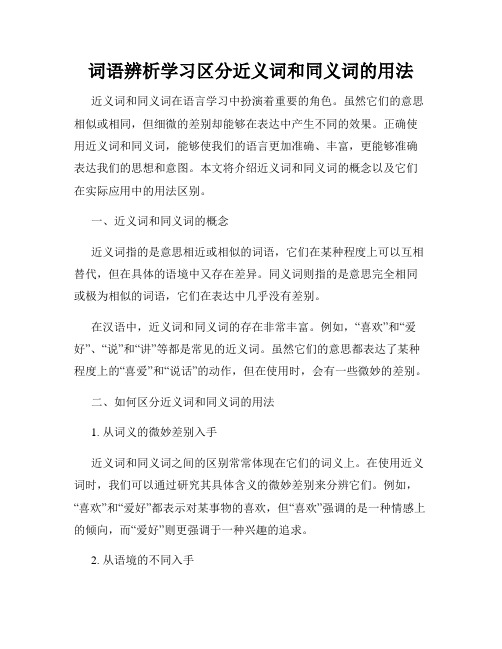
词语辨析学习区分近义词和同义词的用法近义词和同义词在语言学习中扮演着重要的角色。
虽然它们的意思相似或相同,但细微的差别却能够在表达中产生不同的效果。
正确使用近义词和同义词,能够使我们的语言更加准确、丰富,更能够准确表达我们的思想和意图。
本文将介绍近义词和同义词的概念以及它们在实际应用中的用法区别。
一、近义词和同义词的概念近义词指的是意思相近或相似的词语,它们在某种程度上可以互相替代,但在具体的语境中又存在差异。
同义词则指的是意思完全相同或极为相似的词语,它们在表达中几乎没有差别。
在汉语中,近义词和同义词的存在非常丰富。
例如,“喜欢”和“爱好”、“说”和“讲”等都是常见的近义词。
虽然它们的意思都表达了某种程度上的“喜爱”和“说话”的动作,但在使用时,会有一些微妙的差别。
二、如何区分近义词和同义词的用法1. 从词义的微妙差别入手近义词和同义词之间的区别常常体现在它们的词义上。
在使用近义词时,我们可以通过研究其具体含义的微妙差别来分辨它们。
例如,“喜欢”和“爱好”都表示对某事物的喜欢,但“喜欢”强调的是一种情感上的倾向,而“爱好”则更强调于一种兴趣的追求。
2. 从语境的不同入手同一个词语在不同的语境中有时候会有不同的用法。
因此,我们可以通过观察词语在具体语境中的用法来区分近义词和同义词。
例如,“说”和“讲”都表示说话的动作,但在某些特定的语境中,“说”更常用于日常交流中的泛指,而“讲”则较多用于演讲、教学等专业场合。
3. 从搭配的不同入手近义词和同义词在搭配上也常常有所差异,通过观察其常见的搭配可以更好地区分它们。
例如,“快乐”和“幸福”都表示一种积极愉快的心情,但在搭配上,“快乐”常与“感到”、“充满”等词语搭配,而“幸福”常与“生活”、“家庭”等词语搭配。
三、如何更好地学习和应用近义词和同义词1. 利用词典和语料库学习近义词和同义词的一个有效方法是利用词典和语料库。
通过查找词语的释义和在实际语料中的使用情况,我们可以更深入地理解它们的用法差异。
同义词与近义词辨析

谢谢!
3.集体与个体
树林——树 书籍——书 人口——人
4.搭配对象不同
交换——礼物、意见、资料、产品 交流——思想、经验、文化、物资
色彩义不同
1. 感情色彩
成果——结果——后果
(褒) (中) (贬)
2.语体色彩
父亲——爸爸 头部——脑袋 什么——啥
词性方面的差异
深刻(adj.)——深入(v.) 愿望(n.) ——希望(n.&v.) 突然(adj.)——猛然(adv.)
同义词辨析
等义词辨析
1.铁路——铁道 2.自行车——脚踏车 3.全神贯注──聚精会神
近义词辨析
1.理性意义的差异 2.色彩义不同 3.词性方面的差异
理性意义的差异
1.意义的轻重
轻视——藐视 失望——绝望 希望——渴望 违背——违反
2.范围的大小
边疆(大)——边境 战争(大)——战役 性质(大)——品质
语文高考同义词与近义词辨析词典(3)
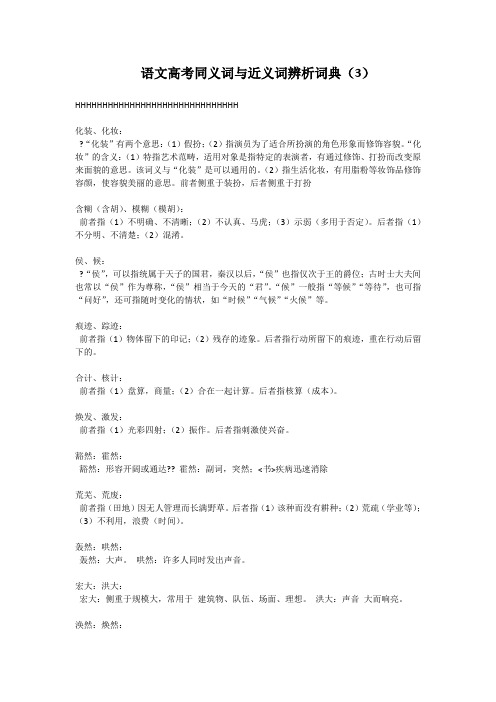
语文高考同义词与近义词辨析词典(3)HHHHHHHHHHHHHHHHHHHHHHHHHHHHHH化装、化妆:?“化装”有两个意思:(1)假扮;(2)指演员为了适合所扮演的角色形象而修饰容貌。
“化妆”的含义:(1)特指艺术范畴,适用对象是指特定的表演者,有通过修饰、打扮而改变原来面貌的意思。
该词义与“化装”是可以通用的。
(2)指生活化妆,有用脂粉等妆饰品修饰容颜,使容貌美丽的意思。
前者侧重于装扮,后者侧重于打扮含糊(含胡)、模糊(模胡):前者指(1)不明确、不清晰;(2)不认真、马虎;(3)示弱(多用于否定)。
后者指(1)不分明、不清楚;(2)混淆。
侯、候:?“侯”,可以指统属于天子的国君,秦汉以后,“侯”也指仅次于王的爵位;古时士大夫间也常以“侯”作为尊称,“侯”相当于今天的“君”。
“候”一般指“等候”“等待”,也可指“问好”,还可指随时变化的情状,如“时候”“气候”“火候”等。
痕迹、踪迹:前者指(1)物体留下的印记;(2)残存的迹象。
后者指行动所留下的痕迹,重在行动后留下的。
合计、核计:前者指(1)盘算,商量;(2)合在一起计算。
后者指核算(成本)。
焕发、激发:前者指(1)光彩四射;(2)振作。
后者指刺激使兴奋。
豁然:霍然:豁然:形容开阔或通达?? 霍然:副词,突然;<书>疾病迅速消除荒芜、荒废:前者指(田地)因无人管理而长满野草。
后者指(1)该种而没有耕种;(2)荒疏(学业等);(3)不利用,浪费(时间)。
轰然:哄然:轰然:大声。
哄然:许多人同时发出声音。
宏大:洪大:宏大:侧重于规模大,常用于建筑物、队伍、场面、理想。
洪大:声音大而响亮。
涣然:焕然:涣然:形容嫌隙、疑虑、误会等完全消散、消失。
如“涣然冰释”。
焕然:光彩焕发。
如“光彩焕然”。
惶惶:遑遑:煌煌:惶惶:惊恐不安,如“人心惶惶”、“惶惶不安”、“惶惶不可终日”。
遑遑:匆忙不安定,如“遑遑无所依归”。
煌煌:光彩夺目、盛大醒目,如“煌煌数百万言”、“灯光煌煌”。
同义词的辨析方法

同义词的辨析方法现代汉语的词语浩如烟海、丰富多彩,其中有为数不少的词语,它们在意义上相近,这给我们平时的使用带来诸多的不便与麻烦。
因此,对这些词语要学会加以辨析,否则,就会造成误解误用。
严格地说,任何一组近义词都有一些细微的差别,我们如果能掌握一些辨别的方法,往往能够起到事半功倍的效果。
下面,笔者列举一些近义词的辨别的方法,希望能给读者有所帮助。
一、去同存异现代汉语中,有相当一部分的近义词,它们都有共同的语素,比如“承载”和“装载”这一组近义词,它们的共同语素就是“载”。
对于这一类词,我们在辨析时,就可以采用“去同存异”法。
“承载”和“装载”这一组近义词,我们辨析的时候,先将共同的语素“载”去掉,这叫“去同”,然后对“异”字进行组词或简易解释。
“承”字可组词为“承受(担)”,“装”字可组词为“装货物(东西)”,这样,这两个词的区别也就呼之欲出了。
“承载”有承受物体重量的意思;“装载”有用运输工具装东西的意思。
当然,给这类词进行组词的时候,所组之词要尽可能的将这两组近义词区分开来。
例:邓小平理论坚持解放思想、实事求是,在新的实践基础上继承前人又突破,开拓了马克思主义的新境界。
( a 成规 b 陈规)“成规”“陈规”这一组近义词,它们有共同语素,辨析时可采用“去同存异”法。
具体做法是先将“规”字去掉,然后分别对“异”字“成”“陈”组词或解释。
“成”可组词为“现成的”或“形成”;“陈”可组词为“陈年老酒”,进一步引申,可解释为“旧的”,结合原题,本题应选“陈规”,即“旧的,不适用的旧规章”。
练习:①这一招真。
(a 、厉害 b 、利害)②他将办公桌上已用过的资料起来。
(a 、收集b 、搜集)二、以词造句“去同存异”法可以分辨一些有共同语素的近义词,但也有一些近义词却无法用“去同存异”法进行辨别,这时可以用另一种方法——“以词造句”法进行辨析。
例如“志愿”和“自愿”这一组近义词,我们辨别时可根据这两个词进行简单的造句。
近义词辨析方法归类
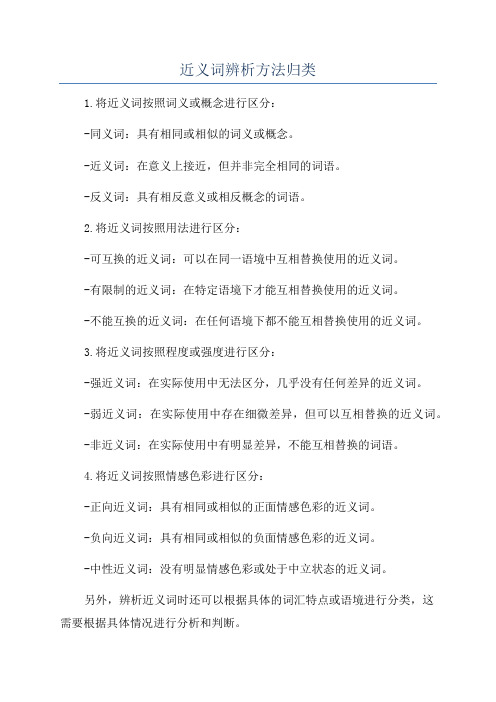
近义词辨析方法归类
1.将近义词按照词义或概念进行区分:
-同义词:具有相同或相似的词义或概念。
-近义词:在意义上接近,但并非完全相同的词语。
-反义词:具有相反意义或相反概念的词语。
2.将近义词按照用法进行区分:
-可互换的近义词:可以在同一语境中互相替换使用的近义词。
-有限制的近义词:在特定语境下才能互相替换使用的近义词。
-不能互换的近义词:在任何语境下都不能互相替换使用的近义词。
3.将近义词按照程度或强度进行区分:
-强近义词:在实际使用中无法区分,几乎没有任何差异的近义词。
-弱近义词:在实际使用中存在细微差异,但可以互相替换的近义词。
-非近义词:在实际使用中有明显差异,不能互相替换的词语。
4.将近义词按照情感色彩进行区分:
-正向近义词:具有相同或相似的正面情感色彩的近义词。
-负向近义词:具有相同或相似的负面情感色彩的近义词。
-中性近义词:没有明显情感色彩或处于中立状态的近义词。
另外,辨析近义词时还可以根据具体的词汇特点或语境进行分类,这
需要根据具体情况进行分析和判断。
词语的近义词和反义词辨析

词语的近义词和反义词辨析近义词和反义词是语言中常用的词汇,它们在表达中发挥着重要的作用。
准确理解和运用近义词和反义词,可以丰富语言表达,提高沟通效果。
本文将从不同角度介绍词语的近义词和反义词的辨析,并给出常见的例子。
一、近义词的辨析1. 同义词同义词是指在意义上相近或相似的词语。
使用同义词可以使表达更加丰富,避免重复。
例如:(1) 意思:含义、内涵、涵义(2) 美丽:漂亮、秀丽、优美(3) 神秘:奥秘、玄妙、隐秘2. 近义词近义词是指在词义上相近、但不完全相同的词语。
它们可能从不同角度或程度描述同一事物或概念。
例如:(1) 勇敢:勇猛、刚毅、英勇(2) 讨厌:厌恶、厌烦、反感(3) 害怕:恐惧、胆怯、惧怕3. 联想词联想词是与某一特定词语密切相关的其他词语。
它们可以通过联想来增加词语的形象和表现力。
例如:(1) 阳光:明亮、温暖、灿烂(2) 美食:佳肴、佳肴、美味佳肴(3) 春天:花开、燕丽、鸟语二、反义词的辨析反义词是指意义互相对立或相反的词语。
正确运用反义词可以使表达更加准确、明确。
例如:1. 对称关系的反义词对称关系的反义词是指通过否定来表示两个事物之间的对立关系。
例如:(1) 高矮:高、矮(2) 快慢:快、慢(3) 善恶:善、恶2. 互补关系的反义词互补关系的反义词是指相互补充、互为对立的词语。
例如:(1) 黑白:黑、白(2) 富贵:富、贵(3) 宽窄:宽、窄3. 否定关系的反义词否定关系的反义词是通过对词语进行否定来表达相反的意义。
例如:(1) 优点:缺点(2) 上升:下降(3) 正确:错误三、案例分析下面通过一些常见的例子,进一步对近义词和反义词进行辨析。
1. 明亮与黑暗明亮和黑暗是形容光线强弱的词语。
明亮表示光线较强烈,通常用于描述光线充足的环境。
例如:“房间里明亮的灯光照亮了整个空间”。
而黑暗则表示光线不足或完全没有光。
例如:“山洞里一片黑暗,看不清前方的路”。
2. 安静与嘈杂安静和嘈杂是形容声音的词语。
同义词和同义词辨析

同义词和同义词辨析同义词意义相同或相近的一组词意义相同的叫等义词,意义相近的叫近义词。
一、等义词㈠概念义、附属义完全相同,在任何语境中都能够替换,也叫绝对同义词,如:单车——自行车青霉素——盘尼西林电机——马达六弦琴——吉他立刻——马上㈡概念义相同,附属义有一些细微的差别:西红柿——番茄母音——元音剪刀——剪子玉米——包谷、棒子公尺——米二、近义词美丽——漂亮矗立——耸立——屹立都有:高高的立起的意思,但不同:矗立,着眼于直,是直而高的立着。
用于物,不用于人。
耸立,着眼于高,高而突出的立着。
屹立,着眼于稳固,用于物,也可用于人。
近义词从形式上看,有三种:①语素不同:道路——途径毛病——缺点杰出——卓越美丽——漂亮谨慎——小心企图——打算忧虑——担心检举——揭发②素有同有异:保卫——捍卫辩论——争论严格——严厉希望——期待请求—恳求—哀求—乞求赞赏—赞颂—赞扬—赞叹③素颠倒:力气——气力整齐——齐整展开——开展粮食——食粮情感——感情榜样——样榜兄弟——弟兄到达——达到妒忌——忌妒健康——康健同义词形成的原因:一、认识深化的结果人们在语言实践中因为认识的深化而不断创造新词,新词旧词并存使用,意义上有交叉,于是就形成了同义词。
如:拉:抓住一物,使之离开原处。
拖:磨着地面拉。
提:从下往上拉。
扯:不规则地拉。
抽:只拉其中一个部分。
拽:使劲拉波动:上下起伏地动摇动、摆动、晃动:前后或左右地动转动:围绕一点旋转地动。
移动、挪动:从一个位置移到了另一个位置。
二、客观现象相近、相类联系的反映。
看、见、望、顾、窥、盯、观、察三、语汇内部发展的结果(吸收各方面词语的结果)语言的发展具有继承和发展两个方面,一方面创造新词,一方面吸收外来词、方言词、行业语等等,各方面的词并用,于是就出现了众多的同义词见面(会晤)想念(缅怀)生日(诞辰)黎明(拂晓)——古语词扩音器(麦克风)扳手(士巴拿)公共汽车(巴士)发电机(马达)滑稽(幽默)——外来词玉米——包谷、棒子、向日葵(朝阳花、望日莲)——方言四、交际的特殊需要人们对于客观事物的反映,往往带有一种主观的评价。
同义词近义词辨析全解600条

同义词、近义词辨析全解600条<秘书实践与学习>(一)01、黯然、暗然、岸然:“黯然”,指“阴暗的样子”,也用来指“心里不舒服,情绪低落的样子”。
“暗然”的“暗有“光线不足、黑暗”的意思。
“岸然”指“严肃的样子”。
02、爱护、爱戴:适应对象不同,前者上(长辈)对下辈,后者下(幼)辈对上(长辈)。
03、安详、慈祥、祥和:“安详“指神态平静、从容稳重。
“祥”指吉利,如“祥云、祥端、发祥”。
“慈祥”形容老年人的态度神色和蔼安详。
“祥和”指气氛而言。
注意“安详、慈祥、祥和”的写法。
04、安静、宁静:都指没有声音,没有吵闹和喧哗。
“安静”重在稳定,有使安稳平静下来的意思,它有一个由喧闹到安静下来的过程。
而“宁静”重在平和,一般多指环境或心情平和安静,它描述的是一种很安静的状态或气氛。
“宁静”是高于“安静”的一种情境,除了指环境外,更多的时候是指一种心情上的安宁,是人们追求的不受外界干扰的有质量的生活境界。
而“安静”多指环境没有声音或吵闹。
“安静”的使用范围要比“宁静”大一些。
?05、安置、安排:前者指使人或事物有着落,安放。
后者指有条理,有先后的处理。
06、必须、必需:都含有“必要”的意思。
“必须”是副词,有强调语气作用,多作状语。
(1)表示一定要,强调事实或情理上的必要性。
后面带动词或带形容词,有时还可以用在分句前面;(2)加强命令语气;(3)“必须“的否定形式是“无须、不须、不必”。
“必需”是动词,表示一定得有、不可缺少的,作定语或作谓语。
凡是“不可不”的行为就用“必须”。
07、表率、表帅:“表率”是名词,指“好榜样”。
其中“表”为“榜样、模范”,“率”为“表率、楷模”。
“表率”是由“表”和“率”两个同义语素构成的并列式合成词。
在古代汉语中,“表率”也可用作动词,有“督促率领”的意思。
“表帅”,在古代汉语和近代汉语中,用同“表率”的动词意义,表示“督促率领”。
现在一般不用这个词。
因“表帅、表率”同音,“帅”又有“军队中最高的指挥员”的意思,故人们常将“表率”误写为“表帅”。
同义词及其辨析

比喻:手足指兄弟,苏辙《为兄轼下狱上 书》“臣窃哀其志,不胜手足之情,故为冒 死一言”。骨肉为亲人,《韩非子· 五蠹》 “非疏骨肉而爱过客也”。股肱指大臣, 《汉书· 苏武传》“上思股肱之美,乃图画其 人于麒麟阁”。肺腑指心腹,《史· 魏其武 安侯列传》“蚡以肺腑为京师相”。
借代:杜康为酒,曹操《短歌行》“何以解 忧?唯有杜康”。春秋指年龄,贾谊《治 安策一》“天子春秋鼎盛,行义未过,德泽 加焉”。管弦指音乐,白居易《琵琶行》 “主人下马客在船,举酒欲饮无管弦”。口 舌指言语,《史· 留侯世家》“此难以口舌争 也”。
D、适用对象各异 琢、磨:均指雕刻玉石,使成器物,但 “玉谓之琢,石谓之磨。” 口、嘴:都指嘴,但口指人,嘴本作觜, 指鸟。 皮、肤:皮指兽,肤指人。“肤如凝脂 / 相鼠有皮”。
E、感情色彩不同 征、伐:均指军事进攻,但征为褒义词,一般指 上攻下,有道进攻无道。伐在上古是中性词,用 于诸侯之间,不限于上对下使用武力,也不限于 有道对无道,只表示一种公开的军事进攻。 《孟· 尽心》征者,上伐下也。/ 《左· 襄25》齐崔 杼帅师伐我北鄙。 周、比:都有结合义。《论· 为政》“君子周而不比, 小人比而不周”孔安国:忠信为周,阿党为比。 (偏袒一方)旧注:周、比:皆与人亲厚之意, 但周公而比私耳(周:以义结合,比,以利结 合)。
B、词义引申
有些同义词原本意义都不相同,但一经过引申阶 段,变得意义相同了。如: 经 / 缢:原来均无“吊死”义,《说文· 纟部》经, 织纵丝也(织布的纵线,横叫纬);缢,绞也 (两股绳拧在一起,两绳相交而紧)。经由纵丝 引申为悬挂:《庄子· 刻意》“吐故纳新,熊经鸟申 舒展、伸直”(熊经:象熊一样悬挂在树枝上)。 由悬挂引申为吊死:《论语· 宪问》“自经于沟渎而 莫之知也”;《史· 田单列传》“遂经其颈于树枝”。
同义词辨析

3、从等级观念和感情色彩上辩析 、 [妻、妾——后、妃]普通人的称“妻”称 普通人的称“ 妻 后 普通人的称 皇帝的就称“ “妾”,皇帝的就称“后”称“妃”。 [征——伐——侵]都有军事进攻之意。但各 都有军事进攻之意。 征 伐 侵 都有军事进攻之意 有特点: 征者,上伐下也,敌国不相征也” 有特点:“征者,上伐下也,敌国不相征也” 孟子·尽心下 );“凡师有钟鼓曰伐, 尽心下》 (《孟子 尽心下》);“凡师有钟鼓曰伐, 无曰侵” 左传·庄公二十九年 )。可知 庄公二十九年》 无曰侵”(《左传 庄公二十九年》)。可知 指上伐下,有道伐无道,带有褒义; “征”指上伐下,有道伐无道,带有褒义; 指公开宣战,不管双方是非, “伐”指公开宣战,不管双方是非,是中性 则指不宣而战,带有贬义。 词;“侵”则指不宣而战,带有贬义。
词语辨析近义词与同义词有何区别(语文)
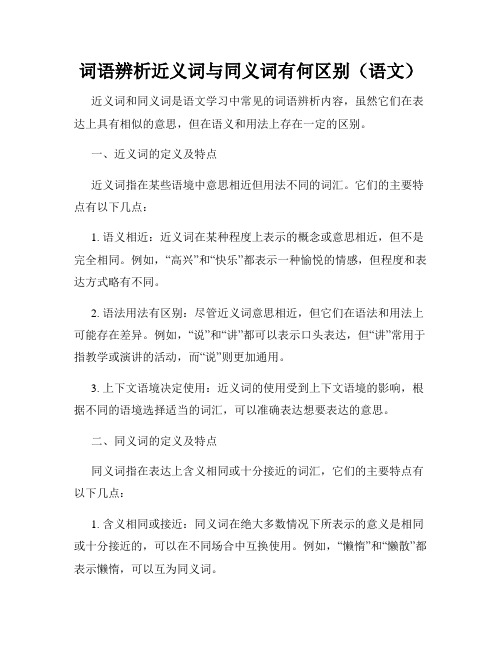
词语辨析近义词与同义词有何区别(语文)近义词和同义词是语文学习中常见的词语辨析内容,虽然它们在表达上具有相似的意思,但在语义和用法上存在一定的区别。
一、近义词的定义及特点近义词指在某些语境中意思相近但用法不同的词汇。
它们的主要特点有以下几点:1. 语义相近:近义词在某种程度上表示的概念或意思相近,但不是完全相同。
例如,“高兴”和“快乐”都表示一种愉悦的情感,但程度和表达方式略有不同。
2. 语法用法有区别:尽管近义词意思相近,但它们在语法和用法上可能存在差异。
例如,“说”和“讲”都可以表示口头表达,但“讲”常用于指教学或演讲的活动,而“说”则更加通用。
3. 上下文语境决定使用:近义词的使用受到上下文语境的影响,根据不同的语境选择适当的词汇,可以准确表达想要表达的意思。
二、同义词的定义及特点同义词指在表达上含义相同或十分接近的词汇,它们的主要特点有以下几点:1. 含义相同或接近:同义词在绝大多数情况下所表示的意义是相同或十分接近的,可以在不同场合中互换使用。
例如,“懒惰”和“懒散”都表示懒惰,可以互为同义词。
2. 用法相似:同义词在语法和用法上基本相同,可以相互替代。
例如,“饮食”和“进食”都表示进食的动作,可以根据不同的口语或书面语场合使用不同的词汇。
3. 使用没有明显差异:同义词的使用基本没有明显的差异,可以根据个人习惯或者句子结构的需要来选择使用。
三、近义词和同义词的区别尽管近义词和同义词在某种程度上意思相近,但它们在以下几个方面存在一定的区别:1. 语意差异:近义词不完全相同,可能会有一些微小的语义差异。
例如,“美丽”和“漂亮”都表示外貌上的吸引力,但“美丽”更多指内外兼修的美,而“漂亮”则更侧重于外表造型的美。
2. 用法差异:近义词在语法和用法上可能存在差异,某些情况下不能互换使用。
例如,“带领”和“领导”都表示引导或指挥别人,但“领导”更常用于指组织或团体的首脑,而“带领”则更常用于指引领、引领等动作。
有效辨析同义词与近义词的小妙招
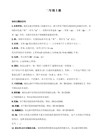
let’s , shall we ?
5 4
let us , will you ?
我们在记忆单词时,可以尝试用数数字的方法,这样有助于我们打破常规记忆方法,形成逻辑思维,让数字不再成为数学的专利。
(3)语音法
英语中,cry和sob都表示“哭”,但是哭的方式与程度却不同。按照cry的音标,要求我们发音时要打开口腔,以饱满圆润的口型发出元音[ai]。这和我们“因为悲伤,疼痛,或其他强烈感情而引发的哭泣”如出一辙,我们正是要像发元音[ai]那样,痛快淋漓地大哭一场,这样就是cry的本意。而sob中短元音[o],因为发音急促,是不是像我们“哽咽,泣不成声地哭”呢?
对于一些发音相近的动词,我们可以利用它们各自的过去式,过去分词来区分记忆。例如,bring和cling,bring的过去式和过去分词都是brought,这和buy“买来”的过去式、过去分词bought有点相似,所以bring有“带来”的意思与buy“买来”有点雷同也就不足为奇了。cling的过去式和过去分词是clung,这和lung“肺”有些相似,肺是我们维持生命的重要器官,我们当然要像cling那样“紧紧抓牢,抓住”。
求同存异法就是我们在记忆形近词时,先保留单词中的相同部分,然后分析研究构成每个单词相异成分的特征。
例如,accident与incident共有“cident”。accident中“ac”与单词ache音相近,ache表示“疼”,能让我们“疼”的就不是“普通事件”,而是不幸的“事故”,因此,accident就是“事故”的意思。incident的意思是“不重要的小事,虽小但却能留下较深印象的事件”。“印象”在英语中是impression,我们可以把incident中的“in”与“impression”中的“im”理解为同一词缀,这样,当我们看到incident时我们就会由此想到让人impression深刻的“小事件”了。
同义词是什么

同义词是什么同义词是什么同义词是汉语词汇,它是什么意思呢?接下来小编为大家推荐的是同义词相关内容,仅供参考。
同义词是什么同义词是指意义相同的一组词语,可以分为等义词和近义词两种。
近义词是指意思相近,但不完全相同;而等义词的意思完全相同。
同义词辨析方法1、从感情色彩上进行辨析,也就是从词的褒贬义去辨析。
如“顽强”与“顽固”,前者表示赞许,后者则表示憎恨。
2、从语意轻重上进行辨析。
如“破坏”与“摧毁”,前者程度浅,后者程度深。
3、从范围大小上进行辨析。
如“战争”与“战斗”,前者范围大,后者范围小。
4、从具体与概括的不同进行辨析。
如“衣服”与“衬衫”,“衣服”是概括性的,指所有衣服,而“衬衫”是具体的,可以指长袖衬衫或短袖衬衫,男式衬衫或女式衬衫等。
5、从对象的不同去辨别。
如“沉重”与“繁重”,都有分量重的意思,但“沉重”指精神或思想负担重,而“繁重”则指工作、任务的数量重。
6、还可以从普通话和方言来辨别。
如“讨饭”与“乞丐”,分别是口头语与书面语;“爸爸”与“父亲”,分别是旧词与新词;如“薪水”与“工资”,分别是外来语与本民族词;如“盐”和“氯化钠”,分别是常用语和专业术语7、可以从词语搭配进行辨别。
如“发挥”与“发扬”。
8、缩减,清华大学和清华。
上古汉语词汇发展的'表现之一是有了丰富的同义词,同义词的辨析无论在现代汉语词汇学还是古汉语词汇学中,都是一项十分重要的内容。
两个义近或义同的词,除了理性意义、词义范围、感情色彩、语体色彩等不同外,还有用法上的不同,而用法上的不同最常见的是表现在词语搭配上。
- 1、下载文档前请自行甄别文档内容的完整性,平台不提供额外的编辑、内容补充、找答案等附加服务。
- 2、"仅部分预览"的文档,不可在线预览部分如存在完整性等问题,可反馈申请退款(可完整预览的文档不适用该条件!)。
- 3、如文档侵犯您的权益,请联系客服反馈,我们会尽快为您处理(人工客服工作时间:9:00-18:30)。
上册1. The whole nation watched the two candidates the issue of raising taxes on TV.Argue: to state,giving clear reasons,that something is true,should be done etcDebate: to discuss a subject formally when you are trying to make a decision or find a solution2. It was a moment for my cousin when she shook hands with the President.Proud: feeling pleased about something that you have done or something that you own,or about someone or something you are involved with or related toArrogant: behaving in an unpleasant or rude way because you think you are more important than other people3. Even if you oil and water,they will not .Mix: if you mix two or more substances or if they mix,they combine to become a single substance,and they cannot be easily separatedBlend: to combine different things in a way that produces an effective or pleasant result,or to become combined in this way4. Some people watch television so much that they cannot of living without it.Conceive: to imagine a particular situation or to think about something in a particular way Imagine; to form a picture or idea in your mind about what something could be like5. As it was an informal dinner,most people in their comfortable clothes.Wear: [transitive] to have something such as clothes,shoes,or jewellery on your body Dress: to put clothes on yourself or someone else6. Do you think those young people are or pragmatic?Idealistic: believing that you should live according to high standards and principles,even if they cannot really be achieved,or showing this beliefIdeal: the best or most suitable that something could possibly be7. Filled with great for their integrity and courage,e was determined to be a man like them. Adulation: praise and admiration for someone that is more than they really deserve Admiration: a feeling of great respect and liking for something or someone8. Deep at night,they could still hear gun-fire in the distance.Ramble: to talk for a long time in a way that does not seem clearly organized,so that other people find it difficult to understand you; To go on a walk in the countryside for pleasure Rumble: to make a series of long low sounds,especially a long distance away from you9. The professor looked over our papers with a hasty .Sight: the act of seeing somethingGlance: to quickly look at someone or something10. Before ordering their dinner,they considered the merits of chicken and roast beef. Relevant: directly relating to the subject or problem being discussed or consideredRelative: having a particular quality when compared with something else11. the little boy‟s constant noise his father,who was busy writing a paper for a symposium. Exhilarate: to make someone feel very excited and happyExasperate: to make someone very annoyed by continuing to do something that upsets them12. isn‟t it to live in a city with so many vehicles passing day and night?Wholesome: likely to make you healthyNoisome: very unpleasant13. He was born in a small town by about 500 people.Live: if you live in a place,you have your home thereInhabit: if animals or people inhabit an area or place,they live there14. Her desk was all with old papers,strings,and other odds and ends.Jumble: to mix things together in an untidy way,without any orderClutter: to cover or fill a space or room with too many things,so that it looks very untidyodds and ends: small things of various kinds without much value15. He thinks they are extremely ,for all their pragmatism.Idealistic,ideal: see number 616. She made one last to her father for permission to go to the party.Attraction: a feeling of liking someone,especially in a sexual wayAppeal: a quality that makes people like something or someone17. The girl looked at the doctor .Terrifyingly: extremely frightening; scaryTerrified: very frightened; scared18. “If you finish all the homework tonight,we‟ll go for a picnic tomorrow,” he . Admonish: to tell someone severely that they have done something wrongCoax: to persuade someone to do something that they do not want to do by talking to them in a kind,gentle,and patient way19. He thought their behavior was ,but he didn‟t say anything in front of the host. Contemptuous: showing that you think someone or something deserves no respect Contemptible: not deserving any respect at all20. Summoned by the boss,he approached his office full of .Apprehension: anxiety about the future,especially about dealing with something unpleasant or difficult; anxietyDistrust: a feeling that you cannot trust someone21. He was sincerely sorry for what happened at the party,so people accepted his .Excuse: a reason that you give to explain careless or offensive behavior; a reason that you invent to explain an action and to hide your real intentionsApology: something that you say or write to show that you are sorry for doing something wrong22. They were walking in the forest when they heard a roar,which made their blood freeze. Terrifying: extremely frighteningTerrific: very good,especially in a way that makes you feel happy and excited;very large in size or degree23. Obviously they were getting nowhere with the meeting,so he decided to from making a final decision that afternoon.Desist: to stop doing somethingResist: to stop yourself from having something that you like very much or doing something that you want to do24. “How can you say that you don‟t want to see your grandmother” the fatter .Admonish,coax: see number 1825. The warrior managed to the arrow that came flying through the air.Evade: to avoid talking about something,especially because you are trying to hide something; to escape from someone who is trying to catch youDodge: to move quickly to avoid someone or something26. They speaker‟s last few words were by the audience‟s thunderous applauses.Drown out: if a loud noise drowns out another sound,it prevents it from being heardStop: prevent,not continue27. Would I be if I joined in your discussion?Intrude: to interrupt someone or become involved in his or her private affairs in an annoying and unwanted wayInvade: to enter a country,town,or area using military force,in order to take control of it28. The of a full stop at the end of the sentence is a deliberate act by the writer.Omission: when you do not include or do not do somethingExclusion: when someone is not allowed to take part in something or enter a place29. The newly-recruited soldiers swore an of loyalty to their countryOath: a formal and very serious promisePromise: to tell someone that you will definitely do or provide something or that something will happen30. The suspect was accused of some important evidence from the court.Prevent: to stop something from happening,or stop someone from doing something Withhold: to refuse to give someone something31. Whether or not he is the best person for the promotion is .Debatable: things that are debatable are not certain because people have different opinions about themArguable: not certain,or not definitely true or correct,and therefore easy to doubt32. He has established himself as a businessman.Credible: deserving or able to be believed or trustedBelievable: something that is believable can be believed because it seems possible,likely,or real33. His story of having discovered the treasure buried by some pirates seemed to everyone Incredible: too strange to be believed or very difficult to believeIncredulous: unable or unwilling to believe something34. “But the piano is out of ”,she said in a disappointed .Tone: the way your voice sounds,which shows how you are feeling or what you meanTune: a series of musical notes that are played or sung and are nice to listen to35. Her friends expressed great to her when her mother died.Sympathy: the feeling of being sorry for someone who is in a bad situationEmpathy: the ability to understand other people…s feelings and problems36. They are now enjoying a short at the seashore.V ocation: the feeling that the purpose of your life is to do a particular type of work,especially because it allows you to help other peopleVacation: a holiday,or time spent not working37. A person is one who is happy with what he has.Content: happy and satisfiedContented: happy and satisfied because your life is good38. All the streets will be tomorrow evening for the celebration.Eliminate:to completely get rid of something that is unnecessary or unwantedIlluminate: to make a light shine on something,or to fill a place with light39. Her in wearing that old-fashioned hat surprised her husband.Perseverance: determination to keep trying to achieve something in spite of difficulties Persistence: determination to do something even though it is difficult or other people oppose it40. The effect of the officer‟s speech was such that the army recovered it‟s at once.Moral: relating to the principles of what is right and wrong behavior,and with the difference between good and evilMorale: the level of confidence and positive feelings that people have,especially people who work together,who belong to the same team etc41. South Africa used to be a country where black people and white people were .Separate: to divide or split into different parts,if something separates two places or two things,it is between them so that they are not touching each otherSegregate: to separate one group of people from others,especially because they are of a different race,sex,or religion42. The letter from her sister so her that she stayed awake half the night,trying to think of a way to get back at her.Embitter: angry,sad,or full of hate because of bad or unfair things that have happened to you Agitate: to make someone feel anxious,upset,and nervousGet back at sb.: to do something to hurt or harm someone who has hurt or harmed you43. You haven‟t seen him for over a year?” he sounded .Incredible: too strange to be believed or very difficult to believeIncredulous: unable or unwilling to believe something44. No matter what he said,the only response he got from him was a “I see” Noncommittal: deliberately not expressing your opinion or intentions clearlyTentative: not definite or certain,and may be changed later45. That plan was too to be adopted.Untrue: not based on facts that are correctUnrealistic: unrealistic ideas or hopes are not reasonable or sensible46. When people looked at him too ,he felt very uncomfortable.Intently: giving careful attention to something so that you think about nothing else Tentatively: not definite or certain,and may be changed later47. Since she didn‟t know anybody in that city,she was rather when accepting the job offer. Hesitant: uncertain about what to do or say because you are nervous or unwillingTentative: done without confidence48. “Do you really think he will give up the position?” he .Scoff: to laugh at a person or idea,and talk about them in a way that shows you think they are stupid; make fun ofScold: to angrily criticize someone,especially a child,about something they have done49. She told the children about her life on the farm all those years ago,how she get up at fourevery morning to milk the cows.Get used to: to have experienced something so that it no longer seems surprising,difficult,strange etcUsed to: if something used to happen,it happened regularly or all the time in the past,but does not happen now50. The teacher told the boys first to some water on the floor before mopping it.Pour: to make a liquid or other substance flow out of or into a container by holding it at an angle Splash: to make someone or something wet with a lot of small drops of water or other liquid CF: sprinkle51. When he was discovered,the pick-pocket a knife to threaten the people around him. Wave: to raise your arm and move your hand from side to side in order to make someone notice youFlap: to move quickly up and down or from side to side,often making a noise52. The eagle suddenly down and snatched the piece of meat.Drift: to move slowly on water or in the airSwoop: if a bird or aircraft swoops,it moves suddenly down through the air,especially in order to attack something53. With the help of the specially trained dogs,they were able to ten people buried in the snow. Rescue: to save someone or something from a situation of danger or harmSave: to make someone or something safe from danger,harm,or destruction54. His feet were numb with cold; as soon as he got into the room he started them vigorously. Rub: to move your hand,or something such as a cloth,backwards and forwards over a surface while pressing firmlyStroke: to move your hand gently over somethingNumb means unable to feel anything55. The kitchen floor has to be every other day.Scrub: to rub something hard,especially with a stiff brush,in order to clean itScrape: to rub against a rough surface in a way that causes slight damage or injury,or to make something do this56. Every night before he went to bed,he of checking all the doors and windows.Made a point: to do something deliberately,even when it involves making a special effort Made a plan: plan to do something57. Students of English are required to the listed 2000 words.Remember: to have a picture or idea in your mind of people,events,places etc from the past Memorize: to learn words,music etc so that you know them perfectly58. You should not be of different religious beliefs.Intolerable: too difficult,bad,annoying etc for you to accept or deal withIntolerant: not willing to accept ways of thinking and behaving that are different from your own59. He tried to the awkward situation with humor.Infuse: to fill something or someone with a particular feeling or quality跟with搭配Fill: if a container or place fills,or if you fill it,enough of something goes into it to make it full60. We have a sense of working towards a goal.Common: common aims,beliefs,ideas etc are shared by several people or groups Ordinary: average,common,or usual,not different or special61. The virus can only be transmitted through contact.Familiar: someone or something that is familiar is well-known to you and easy to recognize Intimate: relating to sex ;Private and friendly so that you feel comfortable62. It suddenly to him that he had worked for twelve hours without eating anything.Happen: if you happen to do something,you do it by chanceOccur: if an idea or thought occurs to you,it suddenly comes into your mind63. The students waited in silence for the Noble Prize winner to make his speech. Respectable: someone who is respectable behaves in a way that is considered socially acceptable Respectful: feeling or showing respect64. The children suffer most when their parents .Divide: if something divides,or if you divide it,it separates into two or more parts Separate: if two people who are married or have been living together separate,they start to live apart65. The teacher the children into several small groups for the trip to the Palace Museum.Allot: to use a particular amount of time for something,or give a particular share of money,space etc to someone or somethingDivide: if something divides,or if you divide it,it separates into two or more parts66. Around mid-night,she received a phone call from someone she did not know of. Mysterious: mysterious events or situations are difficult to explain or understandMiraculous: very good,completely unexpected,and often very lucky67. Do you think soil samples are from the Mars by an unmanned aircraft in the near future? Obtainable: able to be obtainedAbsorbable:可吸收的,容易吸收的68. She was so dear to him that he still kept her picture in a position on his desk.Preeminent:优秀超群的Prominent: something that is in a prominent place is easily seen69. Soft background music will a delicious meal.Enhance: to improve somethingIncrease: if you increase something,or if it increases,it becomes bigger in amount,number,or degree70. He was so disappointed when the manager said that his plan was completely .Dismissible: not deserving to be consideredDisposable: intended to be used once or for a short time and then thrown available to be used71. The baby-sitter kept the kids until we got back from the theater.Accompany: to go somewhere with someoneCompany:固定搭配keep… company= be with her so that she doesn…t feel lonely与谁做伴72. Will the financial prevent you from taking a holiday this summer?Reverse: the exact opposite of what has just been mentionedAdverse: not good or favorable73. The of funds to these universities is decided by the Ministry of Education.Distribution: the act of sharing things among a large group of people in a planned way Allotment: an amount or share of something such as money or time that is given to someone or something,or the process of doing this74. The employees are openly of their corrupt manager.Contemptuous,Contemptible: see number 1975. The gardener was asked to cut the bushes with the fence.Even: flat and level,with no parts that are higher than other partsEqual: the same in size,number,amount,value etc as something else76. His handwriting was so tiny that it was hardly .Readable: interesting and enjoyable to read,and easy to understandLegible: written or printed clearly enough for you to read77. The family secret was brought to light.Shameful: shameful behavior or actions are so bad that someone should feel ashamed Shameless: not seeming to be ashamed of your bad behavior although other people think you should be ashamed78. The bus came to a stop,and some passengers lost their balance.Quick: lasting for or taking only a short timeAbrupt: sudden and unexpected79. Mary aired her at not being treated fairly by the salesperson.Grievances: a belief that you have been treated unfairly,or an unfair situation or event that affects and upsets youGrief: extreme sadness,especially because someone you love has died80. He felt by the enormous difficulties involved in completing the construction of the airport in one year.Daunt: to make someone feel afraid or less confident about somethingDiscouraged: no longer having the confidence you need to continue doing something81. There is a between what he says and what he does.Contrariness: someone who is contrary deliberately does different things from other people Contradiction: a difference between two statements,beliefs,or ideas about something that means they cannot both be true82. It was in the light of the early dawn that I saw a man moving towards me.Dark: if it is dark,there is little or no lightDim: fairly dark or not giving much light,so that you cannot see well83. The poor,sick man is by the policeman‟s endless interrogation.Abuse: to treat someone in a cruel and violent way,often sexually; to deliberately use something for the wrong purpose or for your own advantageTorment: to make someone suffer a lot,especially mentallyInterrogate: to ask someone a lot of questions for a long time in order to get information,sometimes using threats84. Too much food sleepiness.Induce: to persuade someone to do something,especially something that does not seem wise; formal to cause a particular physical conditionTempt: to try to persuade someone to do something by making it seem attractive;85. He for a whole week before making that important decision.Wonder: to think about something that you are not sure about and try to guess what is true,what will happen etcMediate: to try to end a quarrel between two people,groups,countries etc86. A translation is not always the best.Literal translation: a translation that translates each word exactly instead of giving the general meaning in a more natural wayExact: completely correct in every detail87. The author declares that the plot and characters of the novel are .Imaginary: not real,but produced from pictures or ideas in your mindImaginative: containing new and interesting ideas or good at thinking of new and interesting ideasCF imaginable: used to emphasize that something includes every possible example of something88. We walked for miles along the path in the forest.Twisted: something twisted has been bent in many directions or turned many times,so that it has lost its original shapeCrooked: bent,twisted,or not in a straight line89. We advise girls below twenty not to marry,because they are still emotionally .Naive: not having much experience of how complicated life is,so that you trust people too much and believe that good things will always happenImmature: someone who is immature behaves or thinks in a way that is typical of someone much younger - used to show disapproval90. Her feelings between excitement and fear.Fluctuate: if a price or amount fluctuates,it keeps changing and becoming higher and lower Change: to become different,or to make something become different91. The police will not hesitate to use if they bank robbers still refuse to surrender.Force: violent physical action used to get what you wantCompulsion: a strong and unreasonable desire to do something92. After twenty years of antagonism,the two countries were finally .Reconcile: if you reconcile two ideas,situations,or facts,you find a way in which they can both be true or acceptableFriendly: behaving towards someone in a way that shows you like them and are ready to talk to them or help them93. To call the air strikes against Yugoslavia peace-keeping is a lie.Downright: used to emphasize that something is completely bad or untrueThorough: including every possible detail94. “As red as blood” is aMetaphor: a way of describing something by referring to it as something different and suggesting that it has similar qualities to that thingSimile: an expression that describes something by comparing it with something else,using the words …as… or …like…,for example …as white as snow95. The sight of the snake gave me the .Trembling: shaking slightly in a way that you cannot control,especially because you are upset or frightenedShiver: give sb. The shivers=informal to make you feel afraid96. Although the children found the fables most ,they sometimes missed the messages of the stories.Readable:见No.76Understandable: seem normal and reasonable because of the situation you are in97. The office buildings with their locations are very much in demand.Desirable: something that is desirable is worth having or doingDesired: to want to have sex with someone98. Driving after drinking Whiskey to cause traffic accidents.Be about to: if someone is about to do something,or if something is about to happen,they will do it or it will happen very soonBe apt to: to have a natural tendency to do something99. I don‟t want the meaning of the word,I‟m asking you its figurative sense here.Actual: used to emphasize that something is real or exact; used to introduce the most important part of an event or activityLiteral: the literal meaning of a word or expression is its basic or original meaning100. In that part of the world the summer weather is so that even when the sun is shining brightly you never can be sure if it is going to rain in an hour‟s time.Varied: consisting of or including many different kinds of things or people,especially in a way that seems interestingVariable: likely to change often101. He said he would go to the dress rehearsal,he was not too busy.Unless: used to say that something will happen or be true if something else does not happen or is not trueProvided that: used to say that something will only be possible if something else happens or is done102. Something has been wrong with their marriage for a long time,although she makes that it is not.Pretense: a way of behaving which is intended to make people believe something that are not true Excuse: to be or give a good reason fo r someone…s careless or offensive behavior两者的区别在于:前者表示事实上是错的,而在主观上去让别人相信是对的,后者表示对于自己所作所为进行的辩解,而别人并不清楚事实上是对是错.103. The Suzhou Style embroidery very exquisite skills.Requires: if you are required to do or have something,a law or rule says you must do it or have it Acquires: to obtain something by buying it or being given it104. A lot of retired people play chess to time.Kill time: to spend time doing something which is not important while you are waiting to do something important or waiting for something else to happenSpend: to use time doing a particular thing or pass time in a particular place105. He knows that his parents have to work very hard in order to provide for his education,so he never money.Spend: to use your money to pay for goods or servicesSquander: to carelessly waste money,time,opportunities etc106. He wanted a of the report to show to his friends.Transcript: a written or printed copy of a speech,conversation etcManuscript: a book or piece of writing before it is printed107. The workers were filled with when they discovered that they were secretly watched during working hours.Indignity: a situation that makes you feel very ashamed and not respectedIndignation: feelings of anger and surprise because you feel insulted or unfairly treated108. People should their minds of too strong a desire for money.Clean: to remove dirt from something by rubbing or washingPurge: to remove bad feelings109. The policemen risked their lives in order to the children.Preserve: to save something or someone from being harmed or destroyed,保存的意思) Protect: to keep someone or something safe from harm,damage,or illness110. In the past year,quite a few women‟s organizations became active again.Dormant: not active or not growing at the present time but able to be active later Unimportant: not important111. The newspaper‟s of the incident needs to be looked into.Mistake: something that has been done in the wrong way,or an opinion or statement that is incorrectDistortion: to report something in a way that is not completely true or correct112. The heroic deeds of the firefighters should be .Glamorize: to make something seem more attractive than it really isPraise: to say that you admire and approve of someone or something,especially publicly113. She sensed that somebody is following her.Intrinsically: being part of the nature or character of someone or somethingInstinctively: based on instinct and not involving thought114. She is with some urgent work and can‟t see you today.Be occupied with: busy doing somethingBe preoccupy with: thinking about something a lot,with the result that you do not pay attention to other things115. When the twins wear the same kind of clothes,they are almost .Indistinct: an indistinct sound,image,or memory cannot be seen,heard,or remembered clearlyIndistinguishable: things that are indistinguishable are so similar that you cannot see any difference between them116. The quality of a person is more important than his/her appearance.Instinctive: based on instinct and not involving thoughtIntrinsic: being part of the nature or character of someone or something117. human beings can‟t live completely and harmoniously,according to Huxley,men and women will never be beautiful.As long as:只要; In so far as: to the degree that118. They improved their pronunciation by their teacher.Imitate: to copy the way someone behaves,speaks,moves etc,especially in order to make people laughMimic: to copy the way someone speaks or behaves,especially in order to make people laugh119. The way in which TV can a person‟s thinking should never be overlooked.Affect: to do something that produces an effect or change in something or in someone…s situation Effect: to make something happen120. She said that she would the right to take the issue to a higher authority.Preserve: SEE NO.109Reserve: if you reserve the right to do something,you will do it if you think it is necessary - used especially in notices or official documents121. That year he published his first book,which was a success.Spacious: a spacious house,room etc is large and has plenty of space to move around in Huge: extremely large in size,amount,or degree; enormous122. The company is seeking to young managers.Recruit: to find new people to work in a company,join an organization,do a job etc Register: to put someone…s or something…s name on an official list123. “Hong Kong Morning” is an novel that depicts all types of peop le in Hong Kong and the author‟s own struggle with himself.Biographical: a book that tells what has happened in someone…s life,written by someone else Autobiographical: a book in which someone writes about their own life,or books of this type124. He cut stone with a knife and the edge.Blunt: to make the point of a pencil or the edge of a knife less sharpBlurt: to say something suddenly and without thinking,usually because you are nervous or。
